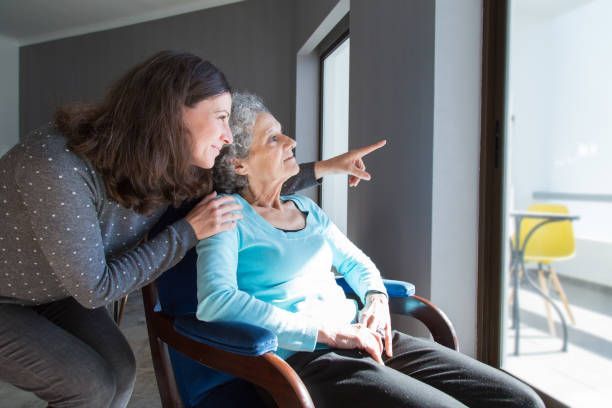Understanding the Risks of Burnout for Family Caregivers
Understanding the Risks of Burnout
for Family Caregivers
At 7 Day Home Care, we understand that family caregiving, while deeply rewarding, can lead to burnout due to the constant physical, emotional, and mental demands it places on caregivers. Engaging a highly competent, dependable, and cost-effective home care agency like ours can significantly alleviate this burden. Our professional caregivers are trained to provide exceptional care, allowing family members to step back and maintain their cherished roles as daughters, sons, spouses, and more, without being overwhelmed by caregiving responsibilities. This balance is crucial as it helps preserve family relationships and ensures that the care provided is both high-quality and sustainable. By partnering with 7 Day Home Care, families can have peace of mind knowing their loved ones are in expert hands, allowing them to focus on spending quality time and creating lasting memories together. 7 Day Home Care is licensed by the New York State Department of Health to provide home care services, including meal preparation in
Manhattan, Queens, Brooklyn, Nassau County, and Suffolk County, New York.

The Vital Role of Family Caregiving in Supporting Elderly Loved Ones Has a Cost
Family caregivers play a pivotal role in providing essential support and care to their loved ones. However, the responsibilities that come with caregiving can be physically, emotionally, and mentally demanding. As a trusted provider of in-home care services in New York City, Brooklyn, Queens, Nassau County, and Suffolk County, 7 Day Home Care recognizes the critical importance of supporting family caregivers. In this article, we shed light on the risks of caregiver burnout, and emphasize the need for self-care and professional support to ensure the well-being of both caregivers and their loved ones.
The Prevalence of Family Caregiving for the Elderly
Family caregivers are an indispensable part of the healthcare system, providing unpaid care to their loved ones with varying medical conditions. The burden of caregiving often falls on family members due to personal commitment and emotional ties. According to the Family Caregiver Alliance, approximately 34.2 million Americans provided unpaid care to an adult age 50 or older in the past year.Family caregiving is prevalent for several reasons, including shifting demographics, an aging population, and the increasing prevalence of chronic health conditions. As life expectancies rise and medical advancements improve, more individuals are living longer, often requiring additional support and care in their later years.
Family members often step in to provide caregiving services due to a strong sense of familial responsibility and a desire to ensure the well-being and comfort of their loved ones. Additionally, cultural and societal norms may emphasize the importance of family care, encouraging individuals to prioritize familial support and caregiving within their communities. However, the prevalence of family caregiving also highlights the need for comprehensive support systems, resources, and policies that can help alleviate the challenges and burdens faced by family caregivers, ensuring that both the caregivers and their loved ones receive the necessary care and support to maintain a high quality of life.
The Toll of Caregiving on the Health of Caregivers
The demanding nature of caregiving can significantly impact the health of family caregivers. The chronic stress and physical strain associated with caregiving responsibilities can lead to various health issues, including anxiety, depression, and compromised immune function.
A study published in the Journal of the American Medical Association (JAMA) found that caregivers are at a higher risk of developing chronic health conditions compared to non-caregivers. More, the responsibility of providing round-the-clock support, emotional care, and physical assistance can lead to increased stress levels, exhaustion, and a compromised immune system. Many caregivers experience heightened levels of anxiety, depression, and burnout, often neglecting their own well-being while prioritizing the needs of their loved ones. The physical demands of caregiving, such as lifting and transferring, can result in musculoskeletal strain and injury. Moreover, the emotional strain of witnessing a loved one's health decline can lead to feelings of helplessness and grief.
Recognizing the impact of caregiving on their health is crucial, prompting the need for adequate support, self-care practices, and access to resources that can alleviate the burdens associated with this demanding role.
Emotional Toll and Mental Health Challenges for Caregivers
Family caregivers often experience emotional strain, feeling overwhelmed, and experiencing a range of negative emotions. Coping with the challenges of caregiving can lead to emotional exhaustion and increase the risk of mental health issues. The National Alliance for Caregiving reports that 40-70% of family caregivers show symptoms of clinical depression.
The continual management of a loved one's health and well-being often leads to heightened levels of stress, anxiety, and emotional exhaustion. Witnessing a family member's declining health or cognitive abilities can evoke feelings of grief, helplessness, and emotional strain. Many caregivers experience a sense of isolation and overwhelming responsibility, often neglecting their own emotional needs and social connections. The constant demands of caregiving can lead to feelings of guilt, frustration, and a sense of loss of personal freedom. Consequently, caregivers are at an increased risk of developing mental health conditions such as depression and anxiety.
Acknowledging the emotional toll and mental health challenges that caregivers face is crucial in providing the necessary support and resources to help them navigate the complexities of their caregiving journey.
Financial Strain on Caregivers
Family caregivers often face financial hardships due to reduced work hours, increased medical expenses, and other caregiving-related costs. Balancing the financial burden while providing quality care can become a significant source of stress.
A study by the AARP Public Policy Institute revealed that family caregivers spend an average of $7,000 per year on caregiving-related expenses. The role of a family caregiver often comes with a significant financial strain, as they may face various expenses related to providing care for their loved ones. This can include costs associated with medical supplies, specialized equipment, and home modifications, as well as expenses related to transportation for medical appointments or treatments. Additionally, the need to reduce working hours or leave the workforce entirely to attend to caregiving responsibilities can lead to a loss of income and potential career advancement opportunities. Caregivers may also encounter additional costs for hiring professional help or respite care to support them in their caregiving role. These financial challenges can contribute to increased stress, limited financial stability, and a potential decline in their overall quality of life.
Recognizing the financial strain on family caregivers underscores the importance of providing them with access to financial assistance programs, resources, and support networks that can alleviate the burden and help them navigate the financial challenges associated with caregiving.
Impact on Relationships and Social Isolation
The intense demands of caregiving can lead to strained relationships with other family members and friends. Many caregivers experience social isolation as they may have limited time for socializing and engaging in activities outside of caregiving.
The National Alliance for Caregiving found that 85% of family caregivers have reported feeling socially isolated. The role of a family caregiver often has a profound impact on their relationships and can lead to social isolation. The demanding nature of caregiving can result in limited time and energy for maintaining relationships with friends and extended family members, leading to feelings of loneliness and disconnection. Caregivers may find it challenging to participate in social activities or community events, leading to a sense of isolation and a lack of emotional support. The strain of balancing caregiving responsibilities with other aspects of life can also lead to increased conflict and strain within familial relationships. Moreover, the need to prioritize the well-being of their loved one often leaves caregivers with limited opportunities for self-care and personal fulfillment, contributing to a sense of emotional and social detachment.
Recognizing the impact of caregiving on relationships and social isolation emphasizes the importance of providing caregivers with access to support groups, counseling services, and respite care options to help alleviate the strain on their relationships and promote social connectedness and emotional well-being.
Family caregivers are unsung heroes who devote their time and energy to caring for their loved ones. However, the risks of caregiver burnout are significant and cannot be ignored. It is essential to prioritize caregiver well-being through self-care, seeking respite care, and accessing professional support when needed. 7 Day Home Care recognizes the value of family caregivers and offers comprehensive in-home care services that can provide relief and support to both caregivers and their loved ones.
If you are a family caregiver in New York City, Brooklyn, Queens, Nassau County, or Suffolk County, consider 7 Day Home Care as your trusted partner in providing quality care. To learn more about our services and how we can assist you in your caregiving journey, visit here or call 516-408-0034 and discover the compassionate care options available to support your unique needs.
Brian Callahan
7 Day Home Care










